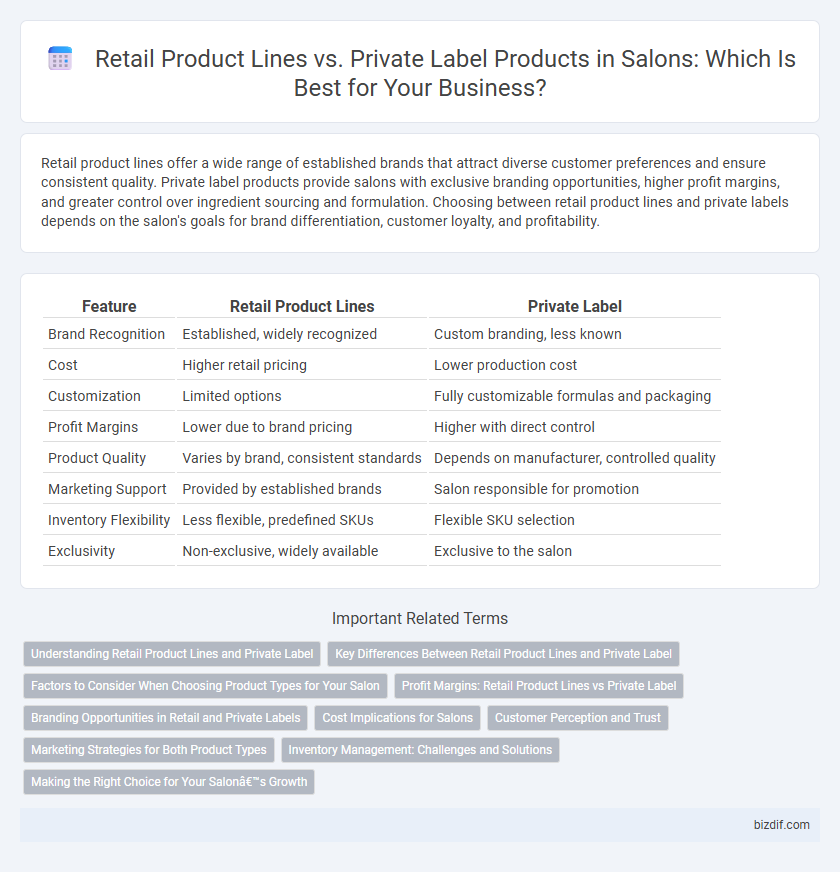Retail product lines offer a wide range of established brands that attract diverse customer preferences and ensure consistent quality. Private label products provide salons with exclusive branding opportunities, higher profit margins, and greater control over ingredient sourcing and formulation. Choosing between retail product lines and private labels depends on the salon's goals for brand differentiation, customer loyalty, and profitability.
Table of Comparison
| Feature | Retail Product Lines | Private Label |
|---|---|---|
| Brand Recognition | Established, widely recognized | Custom branding, less known |
| Cost | Higher retail pricing | Lower production cost |
| Customization | Limited options | Fully customizable formulas and packaging |
| Profit Margins | Lower due to brand pricing | Higher with direct control |
| Product Quality | Varies by brand, consistent standards | Depends on manufacturer, controlled quality |
| Marketing Support | Provided by established brands | Salon responsible for promotion |
| Inventory Flexibility | Less flexible, predefined SKUs | Flexible SKU selection |
| Exclusivity | Non-exclusive, widely available | Exclusive to the salon |
Understanding Retail Product Lines and Private Label
Retail product lines in salons consist of branded items from established manufacturers known for consistent quality and proven customer trust. Private label products, however, are custom-branded items created specifically for a salon, allowing greater control over ingredients, packaging, and pricing strategies. Understanding the differences helps salons optimize inventory by balancing popular retail products with exclusive private label offerings that enhance brand identity and increase profit margins.
Key Differences Between Retail Product Lines and Private Label
Retail product lines consist of branded items produced and marketed by established companies, offering consistent quality and consumer recognition. Private label products are manufactured by third parties and branded under the salon's own name, allowing for greater control over pricing and exclusivity. Key differences include brand ownership, cost structure, and marketing strategies, with private labels providing higher profit margins and retail lines benefiting from existing brand loyalty.
Factors to Consider When Choosing Product Types for Your Salon
When selecting between retail product lines and private label products for your salon, consider factors such as brand recognition, profit margins, and customer loyalty. Retail product lines often provide trusted, established brands that attract clients, while private label options offer higher profit potential and customized branding opportunities. Evaluate your salon's target market, inventory management capabilities, and marketing resources to make an informed choice that aligns with your business goals.
Profit Margins: Retail Product Lines vs Private Label
Retail product lines in salons typically offer lower profit margins due to brand licensing fees and distributor markups, while private label products enable salons to capture higher profits by controlling production costs and branding. Private label lines enhance customer loyalty and allow for premium pricing through exclusive formulations tailored to salon clientele. Investing in private label products often results in greater profitability compared to reselling established retail brands with fixed wholesale prices.
Branding Opportunities in Retail and Private Labels
Retail product lines in salons offer established brand recognition that attracts loyal customers seeking trusted quality, while private label products provide salons with unique branding opportunities to differentiate their services and build customer loyalty through exclusive offerings. Leveraging private label lines allows salons to control product formulation, packaging, and pricing, reinforcing their brand identity and increasing profit margins. Combining retail and private label products enhances brand visibility and customer engagement, driving repeat business and long-term growth.
Cost Implications for Salons
Salons face significant cost implications when choosing between retail product lines and private label options. Retail product lines often come with higher wholesale prices and reduced profit margins due to brand licensing fees, while private label products allow salons to control production costs and enjoy higher profitability by eliminating intermediaries. Investing in private label products requires upfront development costs but results in better long-term cost efficiency and customizable branding opportunities for salons.
Customer Perception and Trust
Retail product lines in salons often benefit from established brand recognition, fostering immediate customer trust due to their widespread availability and marketing presence. Private label products, typically exclusive to the salon, can enhance customer perception by offering unique, salon-endorsed solutions tailored to specific needs, creating a sense of exclusivity and personalized care. Trust in private labels grows as clients experience consistent quality and results, positioning these products as confidently recommended by salon professionals.
Marketing Strategies for Both Product Types
Retail product lines leverage established brand recognition and broad distribution channels to maximize visibility and consumer trust, employing targeted advertising and influencer partnerships to drive sales. Private label products prioritize competitive pricing and exclusive availability within the salon, using in-store promotions and personalized marketing to build customer loyalty and differentiate from mass-market offerings. Strategic use of digital marketing tools and customer data analytics enhances campaign effectiveness for both product types by tailoring messaging to specific audience segments.
Inventory Management: Challenges and Solutions
Retail product lines in salons often require managing diverse inventory from multiple suppliers, complicating stock tracking and reorder processes. Private label products, by contrast, simplify inventory management through centralized sourcing and consistent stock levels, reducing variability and supply chain disruptions. Implementing integrated inventory management software tailored for salons can optimize stock control, minimize overstock and stockouts, and streamline product turnover for both retail lines and private label offerings.
Making the Right Choice for Your Salon’s Growth
Retail product lines offer established brand recognition and consumer trust, providing salons with reliable quality and marketing support to attract and retain clients. Private label products enable salons to customize formulations and branding, enhancing exclusivity and higher profit margins through unique offerings tailored to their target market. Selecting the optimal balance between retail brands and private labels depends on salon goals, client preferences, and growth strategies to maximize revenue and customer loyalty.
Retail Product Lines vs Private Label Infographic

 bizdif.com
bizdif.com